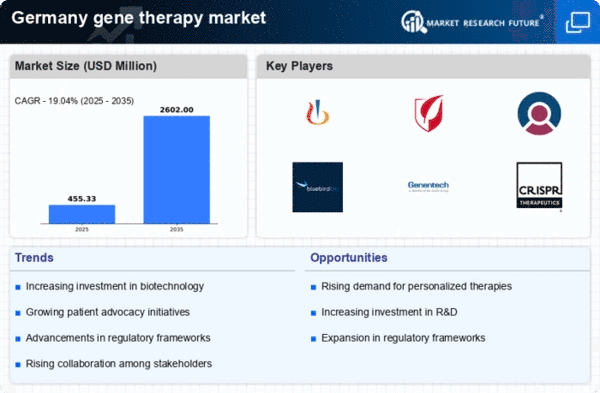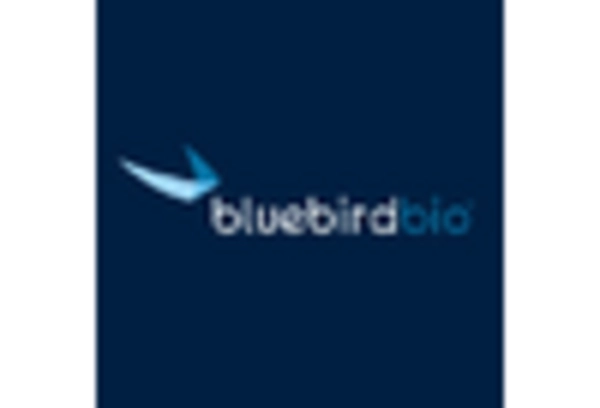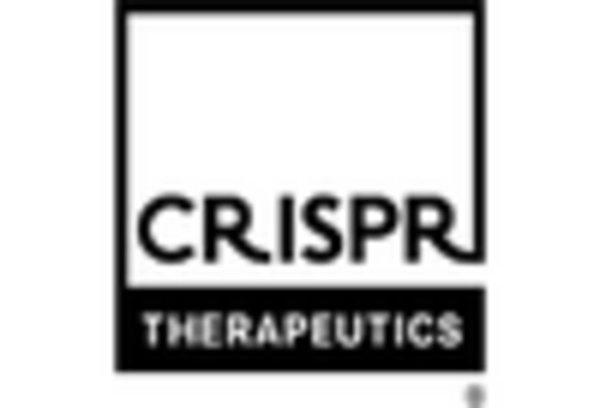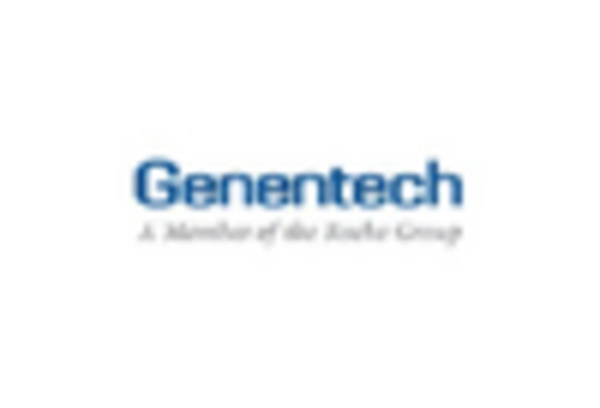Growing Patient Advocacy and Awareness
Patient advocacy groups in Germany are playing an increasingly vital role in raising awareness about genetic disorders and the potential of gene therapy as a treatment option. These organizations are actively engaging with the public and healthcare professionals to disseminate information about available therapies and ongoing clinical trials. As awareness grows, more patients are likely to seek out gene therapy options, thereby driving demand in the market. Furthermore, these advocacy groups often collaborate with researchers and policymakers to influence funding and regulatory decisions, which can further enhance the gene therapy market. The collective efforts of these organizations are expected to create a more informed patient population, ultimately leading to increased uptake of gene therapies.
Rising Prevalence of Genetic Disorders
The increasing incidence of genetic disorders in Germany is a pivotal driver for the gene therapy market. With an estimated 1 in 2000 individuals affected by rare genetic diseases, the demand for innovative treatment options is surging. This trend is further supported by advancements in genetic research, which have identified numerous conditions that could potentially be treated through gene therapy. As healthcare providers and patients seek effective solutions, the gene therapy market is likely to expand significantly. Moreover, the German healthcare system is increasingly recognizing the value of personalized medicine, which aligns with the principles of gene therapy. This growing awareness among healthcare professionals and patients is expected to propel the market forward, as more individuals seek out these cutting-edge therapies to address their specific genetic conditions.
Emerging Biotech Startups and Innovation
The emergence of biotech startups in Germany is significantly contributing to the dynamism of the gene therapy market. These startups are often founded by researchers and entrepreneurs who are passionate about developing innovative therapies for genetic disorders. With access to venture capital and government grants, these companies are pushing the boundaries of gene therapy research and development. The competitive landscape is becoming increasingly vibrant, as these startups introduce novel approaches and technologies that challenge established players in the market. This influx of innovation is likely to stimulate growth in the gene therapy market, as new therapies are developed and brought to market. Additionally, partnerships between startups and larger pharmaceutical companies may further enhance the development and distribution of gene therapies, creating a more robust ecosystem.
Government Support and Funding Initiatives
The German government has been actively promoting the development of the gene therapy market through various funding initiatives and support programs. In recent years, substantial investments have been allocated to research institutions and biotech companies focused on gene therapy innovations. For instance, the Federal Ministry of Education and Research (BMBF) has launched several funding schemes aimed at fostering collaboration between academia and industry. This financial backing is crucial for accelerating the development of new therapies and ensuring that they reach the market efficiently. Additionally, the government is working to streamline regulatory processes, which may further enhance the attractiveness of the gene therapy market for investors and developers. As a result, the combination of financial support and regulatory facilitation is likely to create a conducive environment for growth in the gene therapy market.
Technological Advancements in Gene Editing
Recent technological advancements in gene editing techniques, such as CRISPR-Cas9, are transforming the landscape of the gene therapy market. These innovations enable precise modifications to genetic material, which can lead to more effective and targeted therapies. In Germany, research institutions and biotech firms are at the forefront of these developments, contributing to a robust pipeline of gene therapies. The ability to edit genes with high accuracy not only enhances the efficacy of treatments but also reduces potential side effects, making therapies more appealing to patients and healthcare providers. As these technologies continue to evolve, they are expected to drive the gene therapy market forward, attracting investment and fostering collaborations between research entities and pharmaceutical companies.
















